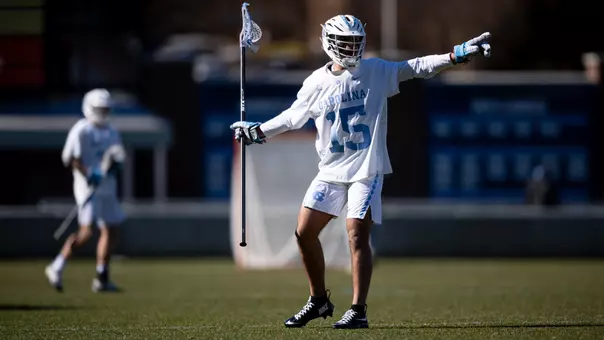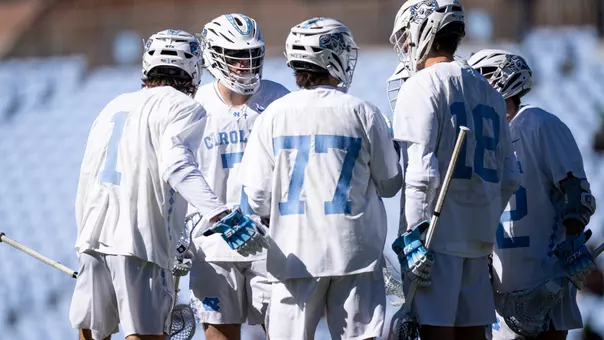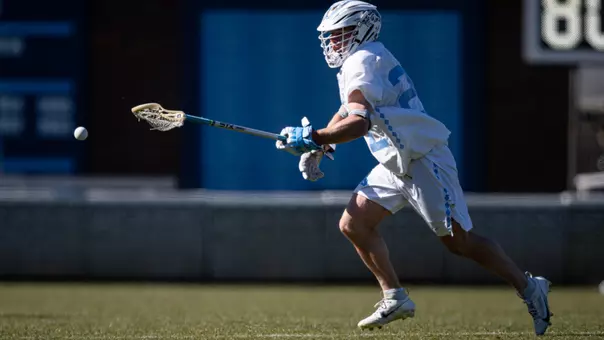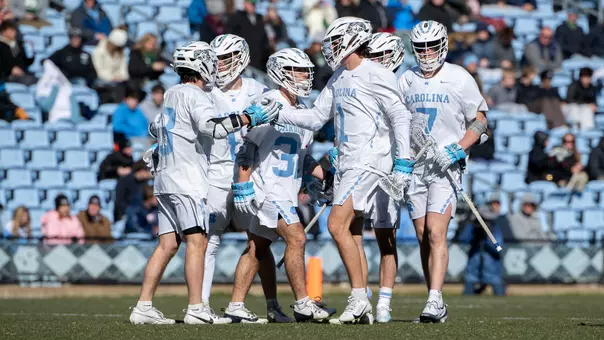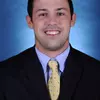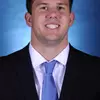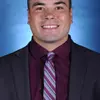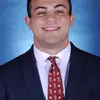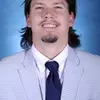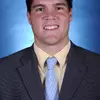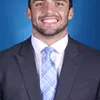University of North Carolina Athletics
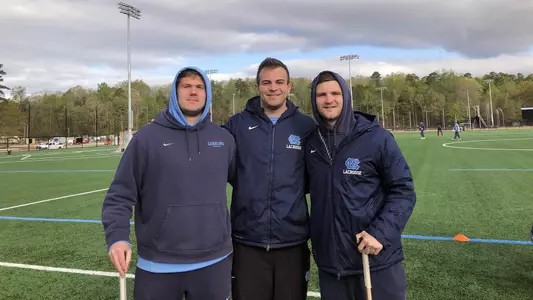
Bug Carper, Mike D'Alessandro, Patrick McCormick
GoHeels Exclusive: Family, Academics, Lacrosse
April 20, 2018 | Men's Lacrosse, Featured Writers
By Pat James, GoHeels.com
Four years and four surgeries later, the moment finally arrived, the one Mike D'Alessandro had been waiting for.
Knee injuries had sidelined him since his senior year of high school. But on Feb. 4, 2017, D'Alessandro, then a junior on the North Carolina men's lacrosse team, made his long-awaited collegiate debut in a 17-6 win over UMBC.
At times, D'Alessandro thought he'd never get the opportunity to play for the Tar Heels. He'd slogged through rehab to do so. And because of the effort he'd put in to finally achieve that goal, it made his decision to medically retire just a few weeks later even more difficult.
"I just wasn't as fast and wasn't as explosive as I used to be," he said. "I was just in a lot of pain and realized that was it."
D'Alessandro said his decision left him pondering questions about his future. But if he ever had any doubts about whether or not he'd continue being involved with the UNC lacrosse program, Coach Joe Breschi resolved those immediately.
"He was like, 'Hey, I'll let you dress the rest of the year. Then next year, you can still help out and be like a coach and help the guys out when you see things we don't see,'" said D'Alessandro, now a senior. "He was very helpful with making sure I felt like a part of the team still."
Fellow seniors Bug Carper and Patrick McCormick heard the same message when they were dealt career-ending injuries. All three student-athletes have since remained on the team and helped with whatever they can. They've also kept their jersey numbers and roster spots.
Their presences, perhaps as much as anything, exemplify the "Family, Academics, Lacrosse" mantra that Breschi's teams have embraced over the last 10 years.
"As soon as they commit to Carolina, they keep their scholarship regardless of injury," Breschi said. "In my eyes, they've committed to us, I've committed to them. And I'm never going to go back on that. I certainly appreciate that commitment and that part of being a family.
"That's what makes Carolina lacrosse special from a family standpoint is we all stick together through thick and thin."
Taking positives out of negatives
D'Alessandro expressed hesitancy about playing lacrosse, at least at first.
Growing up in Franklin Lakes, N.J., he participated in baseball and football. He possessed no knowledge of lacrosse. When his father, Michael, suggested the idea of him playing the sport when he reached fourth grade, D'Alessandro said he was afraid of the ball hitting him.
Still, his father thrust him into lacrosse. And he thrived.
"Probably freshman year of high school I could see I was a lot better than other people," D'Alessandro said. "I was just progressing really well."
After his sophomore season of high school, he made the All-Star team at Maverik Showtime Camp. Several schools came calling, he said, including UNC. He committed within a month.
But shortly after, his first injury occurred.
In the semifinals of the state playoffs during his junior season, D'Alessandro said he tore his ACL in his left knee. It seemed then like a minor setback. As he recovered, he came to the decision that he'd play both lacrosse and football at Carolina. Yet he opted not to play the latter after tearing his ACL in his right knee late in his senior year.
He said he underwent three more surgeries in college. All were performed to repair the cartilage in his left knee.
"Every year basically I've had to find out that I've needed a surgery," he said. "I've shed a lot of tears, especially in front of my senior class, because I'm really emotional, I'm really passionate about just playing and everything about lacrosse."
D'Alessandro said Breschi has always thought he inspired the team. So even before D'Alessandro medically retired, Breschi brought him to every game.
The week of the Tar Heels' visit to Duke on April 1, 2016, D'Alessandro said he learned he needed another surgery. Breschi called him to the front of the room after practice one day. And as he explained D'Alessandro's situation to the team, Breschi dedicated the game to him.
Players wore helmet stickers with D'Alessandro's No. 5 as UNC defeated Duke 17-16 in overtime. Eight weeks later, the Tar Heels won the 2016 NCAA championship in Philadelphia. D'Alessandro dressed then for the first time all season.
"It was really special to be able to share that experience with everybody," he said, "and to be wearing my jersey"
After medically retiring the next season, D'Alessandro said it took about a semester for him to start thinking positively about his situation. But his injuries changed his perspective on life.
He's been active in community service, helping kids at Northside Elementary, volunteering at the children's playroom at UNC Hospitals and visiting nearby nursing homes. He's currently a member of UNC's Student-Athlete Advisory Council and Carolina INCUBATE.
"I appreciate things a lot more," D'Alessandro said. "I have a way better outlook on life than I used to. Not that I would ever wish these injuries on anyone, but they made me a better person. I've learned to take the positives out of negatives, and it's helped me a lot."
Mentally tough
He knew he was only one concussion away.
McCormick, from Hicksville, N.Y., started attending lacrosse clinics when he was in kindergarten. A few years later, he began playing in organized competitions. He also played hockey. And around fourth grade, he sustained his first concussion playing that sport.
By the time he arrived at UNC – where his brother's best friend, Bobby McAuley, was a captain in 2009 – McCormick said he had suffered seven concussions.
"But I never really said anything about it," McCormick said. "I just kind of kept it to myself."
He played in two games as a freshman. Then in the fall of his sophomore season, he said he sustained his first concussion at UNC.
Playing basketball, McCormick said he tried to block a shot. He tripped over someone's feet when he landed, and he fell face-first into a brick wall. The wall split his eyebrow open. He missed the rest of the fall lacrosse season.
Four practices into the spring, he said he suffered another concussion.
"For the rest of the year, I was fine," McCormick said. "But it was starting to get to a point where I wasn't the same player I used to be and I was a lot more scared playing. And then just my physical wellbeing, I became a lot more anxious and less attentive to things."
He loved playing lacrosse. But he said he realized then that with another concussion, he'd need to medically retire.
Finally, in the fall of his junior year, McCormick said he was dodging when he was pushed into the goalpost. He immediately knew what had happened, what the injury meant. Still, that didn't lessen the shock. But Breschi and the rest of the coaching staff eased his feelings of anxiety.
"(Breschi) didn't know what I was thinking exactly during that period of time, I'm assuming," McCormick said. "But I remember the coaches reached out to me right away and just made me feel that they were there for me no matter what and they just wanted my health to come first, which I thought was really important to me.
"They welcomed me with open arms and just wanted me to feel better and to be healthy."
Despite his concussions, McCormick said he still felt like he could provide some value. So he began helping D'Alessandro with tasks such as picking up lacrosse balls, helping the athletic training staff and team managers, and keeping score during scrimmages.
McCormick said he's tried to help offensive coordinator David Metzbower as much as possible. He can also be found shooting at the goalies.
"I feel like that helps the goalies out a little bit and makes them a little bit better," McCormick said. "They can see different types of shots, which is definitely important because not every shooter is the same in college lacrosse."
Neither are their experiences. And McCormick said he's grown from his.
"Going through a really crappy experience like medically retiring and getting something you love taken away from you is definitely a really bad thing that sucked for me," he said. "But I think persevering through the injuries and trying to come back multiple times made me feel mentally tough and I think I am mentally tougher because of it."
'Just another steppingstone"
Looking back now, Carper says he took a lot of things athletically for granted.
From the moment he started playing lacrosse in fourth grade, Carper, from Hollis, N.H., said much of his success came from being athletic and having good feet. He didn't start working out until high school. But once he did, he quickly became one of the strongest people at The Governor's Academy in Byfield, Mass.
He also played football. And from his involvement with that sport, some hip issues surfaced.
Before his freshman year of high school, he said he went to Boston Children's Hospital, where he received some hip injections. The pain subsided. A two-sport athlete at the time, he rested in the winter and felt fine during the lacrosse and football seasons.
"But as soon as I got here my freshman year, that's kind of when every single day of the fall is conditioning," Carper said. "You're running more than you're walking."
He said his hip problems started to reemerge then. But as a freshman looking to prove himself, he pressed on.
Carper played in two games during his freshman season at UNC. Yet his hip troubles continued. By that summer, he said he could only run for about 10-15 minutes before his hips would begin locking up. He spent a majority of his sophomore fall rehabbing before undergoing back-to-back hip surgeries in the spring. They were performed five weeks apart.
Upon his return to lacrosse in the fall of his junior year, Carper said he was defending McCormick when he made a cut and his hip popped.
"It just killed," Carper said. "The pain kind of subsided, but it felt really, really loose."
Yet he kept playing. Just stretching that hip flexor, he said, became an excruciating task. And it eventually reached the point where he could barely walk after practices.
Carper said he decided to make a return visit to his surgeon, who initially couldn't figure out what was wrong with him based on his symptoms and MRIs. Finally, an arthrogram revealed his hip capsule was torn. He underwent a third surgery.
He began practicing again toward the end of last season. Continuing to rehab in Charlotte over the summer, he said he even played in a men's lacrosse league. But last fall, the pain returned.
"I practiced for like a month or something and I just kind of realized, 'I'm not doing myself any favors. This is definitely the end of the line for my lacrosse career,'" Carper said. "But I've been with these guys so long, love showing up to practice every day, just having fun with them. The thought of walking away from any of that was not really in the cards for me."
He said he struggled emotionally with his decision. But speaking with D'Alessandro and McCormick, asking them what it's like being medically retired, made his transition easier.
Like them, Carper was limited in what he was able to accomplish as a player. Yet still being part of the team, part of the Carolina lacrosse family, meant everything, he said.
"Surgeries suck," Carper said. "But I had a fantastic time being with my teammates, being a part of the team, going to practice every single day. There are no regrets there. I think it's just another steppingstone.
"I'm really glad that I went to college here, I'm really glad I was a Tar Heel, I'm really glad I was able to play lacrosse here for Coach Breschi, even if it was for a limited amount of time."
Moving forward
When Carper, D'Alessandro and McCormick medically retired, Breschi said he told them that he wanted them to see what it's like to be a coach.
All three recently said they might be interested in coaching lacrosse at the youth level one day. D'Alessandro said he's consider a high school job. But there's still some time until then.
As for now, D'Alessandro said he will graduate and become an adviser consultant with Lord Abbett, an investment management company headquartered in Jersey City, N.J.
McCormick said he has a job lined up as a junior project manager for L.K. Comstock in New York City. He's also applied to become a New York City Fire Department firefighter; he should receive his results within the month.
Because he underloaded with his surgeries, Carper said he still has some summer school. But he ultimately plans to move to Hilton Head Island, S.C., where his family currently lives.
But before all that, Carper, D'Alessandro, McCormick and 10 other seniors will be recognized at Senior Day on Saturday, when the Tar Heels host Notre Dame at noon at Kenan Stadium. Breschi said he always has mixed emotions on Senior Day. And that will certainly be the case this year.
He'll look at Brian Cannon, Chris Cloutier, Kyle Mathie and William McBride, all key members of the 2016 NCAA championship and 2017 ACC championship teams. He'll spot two-time captain Ryan Macri, who returned for his fifth season. He'll feel for Joe Kenna, the captain whose career also ended because of an injury in the second game of this season.
Breschi will remember what each of them, plus Matt Cunningham, Timmy Gehlbach, Riley Graham and Jordan Prysko, brought to the program. He'll then see Carper, D'Alessandro and McCormick. And he'll reflect on their contributions just as fondly.
"They've already had to face more challenges than the other guys on the team knowing that it's been taken away from them," Breschi said. "What I always say to them is, 'If this is the worst thing in life that happens to you, you're going to be pretty darn successful moving forward with everything. Sure, this was taken away from you. But you still have your mind, your body and your passion for your teammates, this place and this school.'"
And they'll always have their family.
Four years and four surgeries later, the moment finally arrived, the one Mike D'Alessandro had been waiting for.
Knee injuries had sidelined him since his senior year of high school. But on Feb. 4, 2017, D'Alessandro, then a junior on the North Carolina men's lacrosse team, made his long-awaited collegiate debut in a 17-6 win over UMBC.
At times, D'Alessandro thought he'd never get the opportunity to play for the Tar Heels. He'd slogged through rehab to do so. And because of the effort he'd put in to finally achieve that goal, it made his decision to medically retire just a few weeks later even more difficult.
"I just wasn't as fast and wasn't as explosive as I used to be," he said. "I was just in a lot of pain and realized that was it."
D'Alessandro said his decision left him pondering questions about his future. But if he ever had any doubts about whether or not he'd continue being involved with the UNC lacrosse program, Coach Joe Breschi resolved those immediately.
"He was like, 'Hey, I'll let you dress the rest of the year. Then next year, you can still help out and be like a coach and help the guys out when you see things we don't see,'" said D'Alessandro, now a senior. "He was very helpful with making sure I felt like a part of the team still."
Fellow seniors Bug Carper and Patrick McCormick heard the same message when they were dealt career-ending injuries. All three student-athletes have since remained on the team and helped with whatever they can. They've also kept their jersey numbers and roster spots.
Their presences, perhaps as much as anything, exemplify the "Family, Academics, Lacrosse" mantra that Breschi's teams have embraced over the last 10 years.
"As soon as they commit to Carolina, they keep their scholarship regardless of injury," Breschi said. "In my eyes, they've committed to us, I've committed to them. And I'm never going to go back on that. I certainly appreciate that commitment and that part of being a family.
"That's what makes Carolina lacrosse special from a family standpoint is we all stick together through thick and thin."
Taking positives out of negatives
D'Alessandro expressed hesitancy about playing lacrosse, at least at first.
Growing up in Franklin Lakes, N.J., he participated in baseball and football. He possessed no knowledge of lacrosse. When his father, Michael, suggested the idea of him playing the sport when he reached fourth grade, D'Alessandro said he was afraid of the ball hitting him.
Still, his father thrust him into lacrosse. And he thrived.
"Probably freshman year of high school I could see I was a lot better than other people," D'Alessandro said. "I was just progressing really well."
After his sophomore season of high school, he made the All-Star team at Maverik Showtime Camp. Several schools came calling, he said, including UNC. He committed within a month.
But shortly after, his first injury occurred.
In the semifinals of the state playoffs during his junior season, D'Alessandro said he tore his ACL in his left knee. It seemed then like a minor setback. As he recovered, he came to the decision that he'd play both lacrosse and football at Carolina. Yet he opted not to play the latter after tearing his ACL in his right knee late in his senior year.
He said he underwent three more surgeries in college. All were performed to repair the cartilage in his left knee.
"Every year basically I've had to find out that I've needed a surgery," he said. "I've shed a lot of tears, especially in front of my senior class, because I'm really emotional, I'm really passionate about just playing and everything about lacrosse."
D'Alessandro said Breschi has always thought he inspired the team. So even before D'Alessandro medically retired, Breschi brought him to every game.
The week of the Tar Heels' visit to Duke on April 1, 2016, D'Alessandro said he learned he needed another surgery. Breschi called him to the front of the room after practice one day. And as he explained D'Alessandro's situation to the team, Breschi dedicated the game to him.
Players wore helmet stickers with D'Alessandro's No. 5 as UNC defeated Duke 17-16 in overtime. Eight weeks later, the Tar Heels won the 2016 NCAA championship in Philadelphia. D'Alessandro dressed then for the first time all season.
"It was really special to be able to share that experience with everybody," he said, "and to be wearing my jersey"
After medically retiring the next season, D'Alessandro said it took about a semester for him to start thinking positively about his situation. But his injuries changed his perspective on life.
He's been active in community service, helping kids at Northside Elementary, volunteering at the children's playroom at UNC Hospitals and visiting nearby nursing homes. He's currently a member of UNC's Student-Athlete Advisory Council and Carolina INCUBATE.
"I appreciate things a lot more," D'Alessandro said. "I have a way better outlook on life than I used to. Not that I would ever wish these injuries on anyone, but they made me a better person. I've learned to take the positives out of negatives, and it's helped me a lot."
Mentally tough
He knew he was only one concussion away.
McCormick, from Hicksville, N.Y., started attending lacrosse clinics when he was in kindergarten. A few years later, he began playing in organized competitions. He also played hockey. And around fourth grade, he sustained his first concussion playing that sport.
By the time he arrived at UNC – where his brother's best friend, Bobby McAuley, was a captain in 2009 – McCormick said he had suffered seven concussions.
"But I never really said anything about it," McCormick said. "I just kind of kept it to myself."
He played in two games as a freshman. Then in the fall of his sophomore season, he said he sustained his first concussion at UNC.
Playing basketball, McCormick said he tried to block a shot. He tripped over someone's feet when he landed, and he fell face-first into a brick wall. The wall split his eyebrow open. He missed the rest of the fall lacrosse season.
Four practices into the spring, he said he suffered another concussion.
"For the rest of the year, I was fine," McCormick said. "But it was starting to get to a point where I wasn't the same player I used to be and I was a lot more scared playing. And then just my physical wellbeing, I became a lot more anxious and less attentive to things."
He loved playing lacrosse. But he said he realized then that with another concussion, he'd need to medically retire.
Finally, in the fall of his junior year, McCormick said he was dodging when he was pushed into the goalpost. He immediately knew what had happened, what the injury meant. Still, that didn't lessen the shock. But Breschi and the rest of the coaching staff eased his feelings of anxiety.
"(Breschi) didn't know what I was thinking exactly during that period of time, I'm assuming," McCormick said. "But I remember the coaches reached out to me right away and just made me feel that they were there for me no matter what and they just wanted my health to come first, which I thought was really important to me.
"They welcomed me with open arms and just wanted me to feel better and to be healthy."
Despite his concussions, McCormick said he still felt like he could provide some value. So he began helping D'Alessandro with tasks such as picking up lacrosse balls, helping the athletic training staff and team managers, and keeping score during scrimmages.
McCormick said he's tried to help offensive coordinator David Metzbower as much as possible. He can also be found shooting at the goalies.
"I feel like that helps the goalies out a little bit and makes them a little bit better," McCormick said. "They can see different types of shots, which is definitely important because not every shooter is the same in college lacrosse."
Neither are their experiences. And McCormick said he's grown from his.
"Going through a really crappy experience like medically retiring and getting something you love taken away from you is definitely a really bad thing that sucked for me," he said. "But I think persevering through the injuries and trying to come back multiple times made me feel mentally tough and I think I am mentally tougher because of it."
'Just another steppingstone"
Looking back now, Carper says he took a lot of things athletically for granted.
From the moment he started playing lacrosse in fourth grade, Carper, from Hollis, N.H., said much of his success came from being athletic and having good feet. He didn't start working out until high school. But once he did, he quickly became one of the strongest people at The Governor's Academy in Byfield, Mass.
He also played football. And from his involvement with that sport, some hip issues surfaced.
Before his freshman year of high school, he said he went to Boston Children's Hospital, where he received some hip injections. The pain subsided. A two-sport athlete at the time, he rested in the winter and felt fine during the lacrosse and football seasons.
"But as soon as I got here my freshman year, that's kind of when every single day of the fall is conditioning," Carper said. "You're running more than you're walking."
He said his hip problems started to reemerge then. But as a freshman looking to prove himself, he pressed on.
Carper played in two games during his freshman season at UNC. Yet his hip troubles continued. By that summer, he said he could only run for about 10-15 minutes before his hips would begin locking up. He spent a majority of his sophomore fall rehabbing before undergoing back-to-back hip surgeries in the spring. They were performed five weeks apart.
Upon his return to lacrosse in the fall of his junior year, Carper said he was defending McCormick when he made a cut and his hip popped.
"It just killed," Carper said. "The pain kind of subsided, but it felt really, really loose."
Yet he kept playing. Just stretching that hip flexor, he said, became an excruciating task. And it eventually reached the point where he could barely walk after practices.
Carper said he decided to make a return visit to his surgeon, who initially couldn't figure out what was wrong with him based on his symptoms and MRIs. Finally, an arthrogram revealed his hip capsule was torn. He underwent a third surgery.
He began practicing again toward the end of last season. Continuing to rehab in Charlotte over the summer, he said he even played in a men's lacrosse league. But last fall, the pain returned.
"I practiced for like a month or something and I just kind of realized, 'I'm not doing myself any favors. This is definitely the end of the line for my lacrosse career,'" Carper said. "But I've been with these guys so long, love showing up to practice every day, just having fun with them. The thought of walking away from any of that was not really in the cards for me."
He said he struggled emotionally with his decision. But speaking with D'Alessandro and McCormick, asking them what it's like being medically retired, made his transition easier.
Like them, Carper was limited in what he was able to accomplish as a player. Yet still being part of the team, part of the Carolina lacrosse family, meant everything, he said.
"Surgeries suck," Carper said. "But I had a fantastic time being with my teammates, being a part of the team, going to practice every single day. There are no regrets there. I think it's just another steppingstone.
"I'm really glad that I went to college here, I'm really glad I was a Tar Heel, I'm really glad I was able to play lacrosse here for Coach Breschi, even if it was for a limited amount of time."
Moving forward
When Carper, D'Alessandro and McCormick medically retired, Breschi said he told them that he wanted them to see what it's like to be a coach.
All three recently said they might be interested in coaching lacrosse at the youth level one day. D'Alessandro said he's consider a high school job. But there's still some time until then.
As for now, D'Alessandro said he will graduate and become an adviser consultant with Lord Abbett, an investment management company headquartered in Jersey City, N.J.
McCormick said he has a job lined up as a junior project manager for L.K. Comstock in New York City. He's also applied to become a New York City Fire Department firefighter; he should receive his results within the month.
Because he underloaded with his surgeries, Carper said he still has some summer school. But he ultimately plans to move to Hilton Head Island, S.C., where his family currently lives.
But before all that, Carper, D'Alessandro, McCormick and 10 other seniors will be recognized at Senior Day on Saturday, when the Tar Heels host Notre Dame at noon at Kenan Stadium. Breschi said he always has mixed emotions on Senior Day. And that will certainly be the case this year.
He'll look at Brian Cannon, Chris Cloutier, Kyle Mathie and William McBride, all key members of the 2016 NCAA championship and 2017 ACC championship teams. He'll spot two-time captain Ryan Macri, who returned for his fifth season. He'll feel for Joe Kenna, the captain whose career also ended because of an injury in the second game of this season.
Breschi will remember what each of them, plus Matt Cunningham, Timmy Gehlbach, Riley Graham and Jordan Prysko, brought to the program. He'll then see Carper, D'Alessandro and McCormick. And he'll reflect on their contributions just as fondly.
"They've already had to face more challenges than the other guys on the team knowing that it's been taken away from them," Breschi said. "What I always say to them is, 'If this is the worst thing in life that happens to you, you're going to be pretty darn successful moving forward with everything. Sure, this was taken away from you. But you still have your mind, your body and your passion for your teammates, this place and this school.'"
And they'll always have their family.
Players Mentioned
Carolina Insider - Interview with Scott Forbes (Full Segment) - February 13, 2026
Friday, February 13
Carolina Insider - Interview with Sydney Seabrooks (Full Segment) - February 13, 2026
Friday, February 13
WBB: Post-SMU Press Conference - Feb. 12, 2026
Friday, February 13
UNC Women's Basketball: Tar Heels Saddle SMU, 94-42
Friday, February 13











